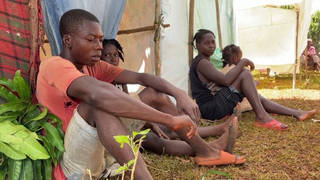
“There are no security issues,” says Dr. Evan Lyon of Partners in Health, reporting from the General Hospital in Port-Au-Prince in Haiti, where 1,000 people are in need of operations. Lyon said the reports of violence in the city have been overblown by the media and have affected the delivery of aid and medical services. [includes rush transcript]
Transcript
JUAN GONZALEZ: Amy Goodman is in Haiti, and we’ll be joining her in a few minutes. But first, we turn to a voice from one hospital in Port-au-Prince that was badly destroyed by last week’s earthquake. The General Hospital is three blocks from the crumbling National Palace.
Former President Bill Clinton visited the hospital Monday, as hundreds of people with broken limbs and multiple fractures were waiting for medical supplies to arrive.
Democracy Now! reached Dr. Evan Lyon at the General Hospital Monday evening. He is a doctor with Partners in Health.
DR. EVAN LYON: We’ve been working around the clock since our team from Partners in Health came to meet up with our Haitian colleagues, who are still here and still leading and still helping us recover to try to get this hospital back up and running. The infrastructure is really, you know, completely destroyed. There is a nursing school on this campus that collapsed completely, killing really, as far as we know now, the entire class of second-year nursing students. The medical school right behind me is — will not ever be usable again.
But the main problem is that this General Hospital, the main general public hospital for the city of Port-au-Prince, is still barely operational. We have a thousand patients scattered throughout the campus, mostly sleeping under the stars or sleeping in tents, a thousand patients who have been triaged, assessed. They’re getting primary care. They’re getting good medical care from Haitian staff and from volunteer international relief staff. But we are just scratching the surface of the operative needs of the orthopedic and other operative needs. Again, 1,000 people in need of operations, and we’re just barely starting to scratch the surface.
Two days ago, we began operating. We had four operating rooms up as quick as possible and have been using them ever since. We don’t have full proper anesthesia. We’re missing many of the materials we need. But that has been working. As of last night, we have some electricity on the campus, and we’ll be able to start operating twenty-four hours a day through this night and on through tomorrow.
I think, you know, the singing and the [inaudible], I know, is clear to many, certainly anyone who has followed Haiti and cared about this special country. One thing that I think is really important for people to understand is that misinformation and rumors and, I think at the bottom of the issue, racism has slowed the recovery efforts of this hospital. Security issues over the last forty-eight hours have been our — quote “security issues” over the last forty-eight hours have been our leading concern. And there are no security issues. I’ve been with my Haitian colleagues. I’m staying at a friend’s house in Port-au-Prince. We’re working for the Ministry of Public Health for the direction of this hospital as volunteers. But I’m living and moving with friends. We’ve been circulating throughout the city until 2:00 and 3:00 in the morning every night, evacuating patients, moving materials. There’s no UN guards. There’s no US military presence. There’s no Haitian police presence. And there’s also no violence. There is no insecurity.
JUAN GONZALEZ: That was Dr. Evan Lyon of Partners in Health talking about the situation at the General Hospital in Haiti.












Media Options